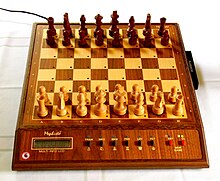Ed Schröder
Ed Schröder (* 1950 in The Hague ) is a Dutch software developer , computer scientist and entrepreneur . He is the programmer of a number of chess programs , such as Gideon , who won the world championship title at the 11th World Microcomputer Chess Championship (Mikro-WM) in 1991, and Rebel , the winner of the 7th World Computer Chess Championship in 1992.
Life

Ed Schröder is a trained computer scientist and programmer and has worked for many years in computer centers and companies on the creation of professional commercial software . From 1979 he started developing a chess program as a hobby . To do this, he used one of the world's first PCs , the TRS-80 from the American Tandy Corporation , and the BASIC programming language . Two years later his first version of the program was ready. She needed ten minutes of computing time to calculate a half move deep from the basic position and to output "E2-E4" as the result.
The task now was to accelerate the program. Ed Schröder ported his algorithms from BASIC into the assembly language of the TRS-80 and was rewarded with a factor of one hundred in acceleration. It could now count six half moves deep. Ed Schröder christened his program " Rebel ", took part in the second Dutch championship in 1982 and achieved third place.
In 1985 he decided to give up his previous professional activity, quit his job and switched to the Munich chess computer manufacturer Hegener + Glaser (H + G). There he rewrote his program in 1986 for the 6502 processor then used in the Apple PC and in the same year he took part in the 5th World Computer Chess Championship in Cologne. He almost managed to win the title. In the last lap, however, while in the lead and in a won position, his program made a bad move. As a result, it lost the game and missed the title.
In the following years he developed many other programs that were sold by H + G under the brand name "Mephisto" (see also Mephisto chess computer ). These included MM IV , MM V , Mephisto Academy (image) , Mephisto Milano , Mephisto Mobil etc. In 1989 he started to port its program again to a more modern and faster hardware, on the Archimedes with RISC - processor of ARM . This took about a year. His work was then crowned in 1991 by winning the World Cup title at the 11th Micro World Cup in Vancouver, with which he was able to overthrow the previous series winner Mephisto from the throne. Ossi Weiner from H + G marketed Ed Schröder's program as Mephisto Gideon .
In the following year, 1992, Ed Schröder trumped his previous year's success by winning the title among the "big ones". His program became world champion at the World Computer Chess Championship (WCCC) in Madrid.
Publications (selection)
- The myth Rajlich copied Fruit (2015) PDF; 840 kB (English) accessed on November 16, 2017
- Rybka Reloaded (2012) PDF; 700 kB (English) accessed on November 16, 2017
- How REBEL Plays Chess (2004) PDF; 270 kB (English) accessed on November 16, 2017
Web links
- Portrait photo of Ed Schröder, accessed November 16, 2017
- Photo of Ed Schröder with the Shannon Trophy immediately after winning the 1992 World Cup, accessed on November 16, 2017
- Photo by Ed Schröder (left) with Jeroen Noomen , accessed November 16, 2017
- Ed Schröder's homepage , accessed on November 16, 2017
- Module (1987) Interview with Ed Schröder PDF; 280 kB accessed on November 16, 2017
Individual evidence
- ↑ Putsch of PC programs - more power - Günter Niggemann reports on the Micro World Cup in Canada in Computer Chess and Games (CSS), No. 3, 1991, pp. 9-17
- ↑ Master of all classes - Ed Schröder won the 7th Computer Chess World Championships in Madrid in CSS, No. 5, 1995, pp. 23–24
- ^ Putsch of PC programs - more power - Günter Niggemann reports on the micro World Cup in Canada in CSS, No. 3, 1991, pp. 9-17
- ↑ Mepisto Gideon Pro accessed on November 16, 2017
- ↑ 10 years of Schröder… - The successful Dutch programmer reports from his professional life in CSS, No. 5, 1995, pp. 23–24
| personal data | |
|---|---|
| SURNAME | Schröder, Ed |
| BRIEF DESCRIPTION | Dutch software developer and entrepreneur |
| DATE OF BIRTH | 1950 |
| PLACE OF BIRTH | The hague |